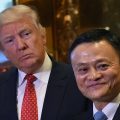
A pedestrian walks past an Apple iPhone 6 advertisement at an electronics store in Mumbai, India. [Photo/Agencies]
Apple Inc is willing to start making iPhones in India, but it wants a big helping hand from Narendra Modi’s government first.
For long, the Cupertino, California-based company’s iPhones and other gadgets like iPads have been assembled in China by contract manufacturers.
That may change now.
On Jan 25, Apple’s officials met Indian officials in New Delhi to discuss the prospects for setting up manufacturing facilities in the country this year.
Apple, the most valuable company on Earth, is asking for a long list of financial concessions from India, one of the poorest countries.
Among the requests, the company is seeking a 15-year tax holiday on imports of components and equipment, according to a person with direct knowledge of the matter.
“We would like Apple to set up base in India,” Ravi Shankar Prasad, minister for information technology, said on Jan 18, without disclosing the company’s negotiating stance.
Apple wants to boost business in India as the country of 1.3 billion becomes the fastest-growing smartphone market and sales flatten in the United States and China.
Tim Cook, Apple CEO, visited the country for the first time in May 2016 as he sought government approval for Apple to open its own stores. India has insisted that Apple, like any single-brand retailer, source 30 percent of its components locally, though the country is relaxing those rules so technology companies can operate stores for three years before meeting that requirement.
Still, Apple wants more. The company had sent a list of requests ahead of its Jan 25 meeting with officials from several government departments, including electronics and commerce, the person said, asking not to be named because the matter is private.
Apple is also asking for a waiver on customs duties for new and used equipment brought into India. The Indian Express newspaper reported Apple wants full exemption from duties on raw materials, components and capital equipment. Apple won’t insist on getting everything on its wish list, the person said.
Apple didn’t respond to requests for comment.
The company doesn’t manufacture devices itself, but rather partners with contract manufacturers to handle the capital-intensive demands of building factories and hiring staff.
One surprise in India is that Apple plans to partner with Wistron Corp of Taiwan province rather than Hon Hai Precision Industry Co, its usual manufacturing source, according to the person.
Assembly of iPhones could start at Wistron’s existing facility in the suburbs of Bengaluru, the person said. The work may be expanded to other suppliers including Hon Hai later, depending on demand, the person said.
Apple and India’s officials have met several times amid a prolific exchange of correspondence, but next week’s meeting will be crucial. If the government gives in to Apple’s demands, it may have to offer similar incentives to other global brands, such as Samsung Electronics Co and Xiaomi Corp.
“Historically, the government has given no such concessions to any other company and there is no room in the policy to do so,” said Anshul Gupta, the Mumbai-based research director at Gartner Inc. “What Apple is asking for is outside the trend so it will be interesting to see how the government looks at it.”
India isn’t the only country pressing Apple for local manufacturing. During his election campaign last year, US President Donald Trump said he wants to see iPhones made in Apple’s home market, part of a broader push to get companies to keep or create manufacturing jobs.
Hon Hai has said that it is in preliminary discussions to broaden its investment in the US.
Prime Minister Modi wants companies to make products in the country as part of his “Make in India” policy, aimed at reaping the benefits that come from manufacturing facilities and jobs. His administration doesn’t want technology companies to sell products and take advantage of its vast consumer base without making their own capital investments.
Despite its global success, Apple is a minor player in India, largely because its phones are too expensive for local consumers. Apple holds about 2 percent of the market in a country where about 500 million smartphones are expected to be sold in the next few years.


